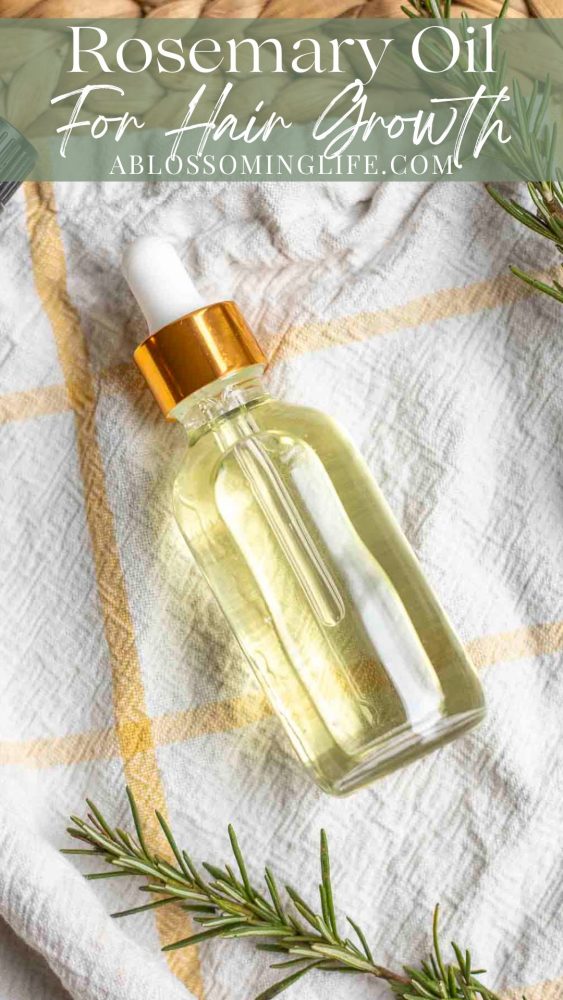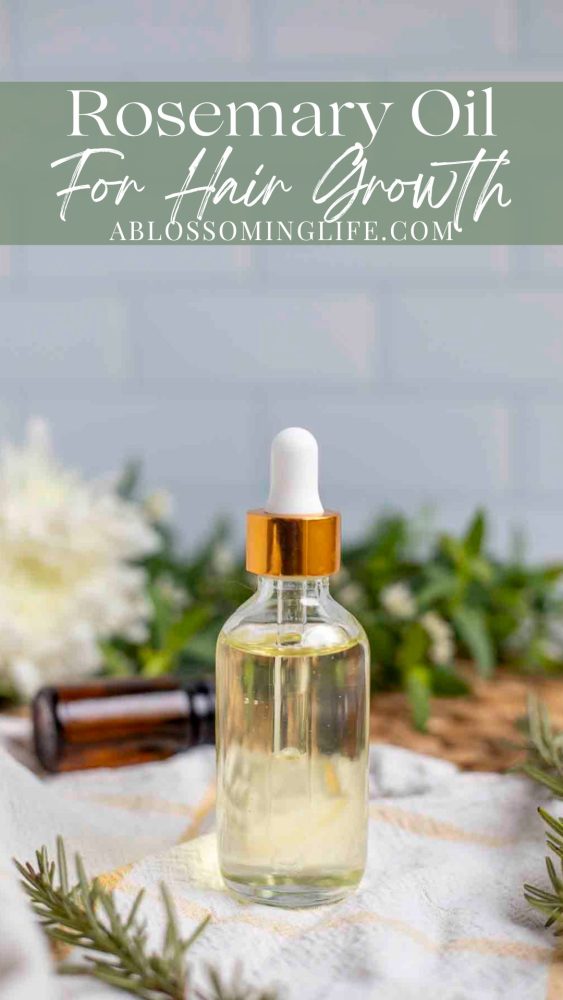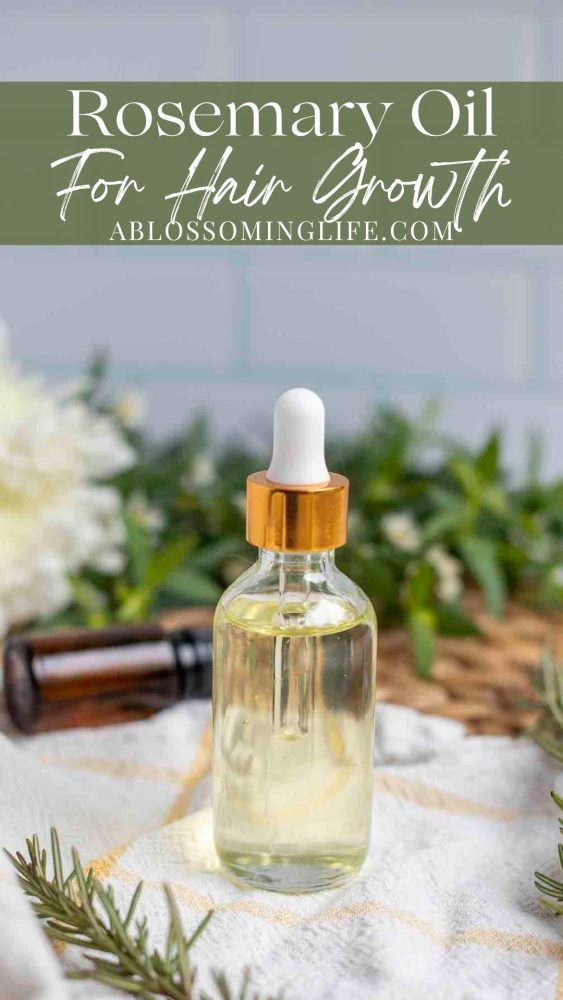How To Make Rosemary Oil For Hair Growth
This post may contain affiliate links. Read disclosure policy.
Learn how to make rosemary oil for hair to promote thick healthy hair and scalp. This recipe may help encourage hair growth and possibly help reduce hair loss.
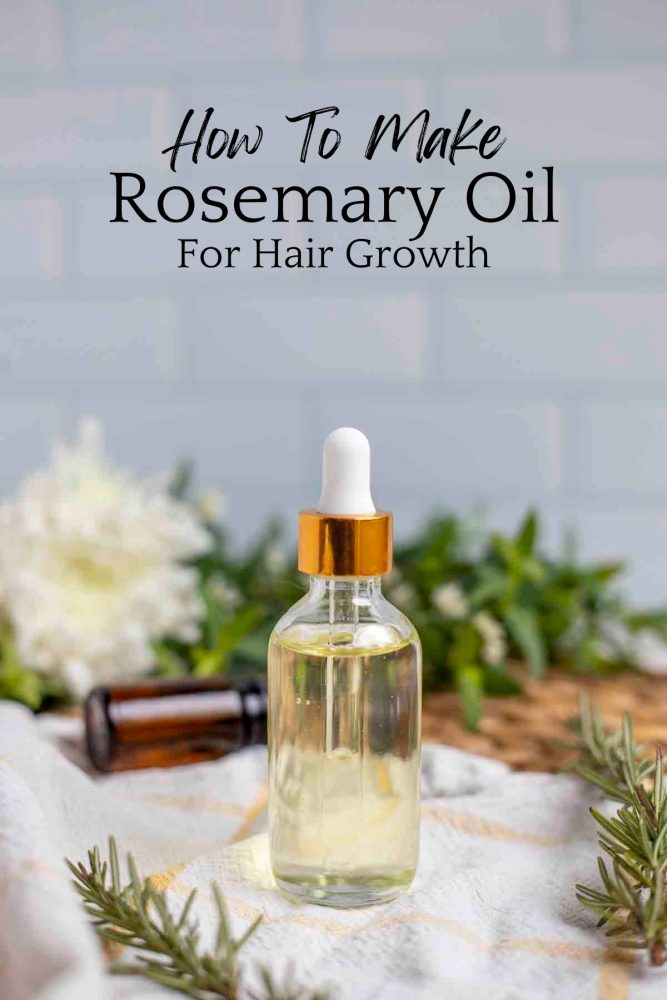
Are you tired of dealing with hair loss and longing for thick, luscious locks? Well, I have a secret for you – this DIY rosemary oil for hair growth.
Yes, you read that right. This simple yet powerful homemade remedy can transform your hair from lackluster to luxurious.
My sweet baby just turned a month old last week and I’m counting down the days for the postpartum hair loss to kick in.
Each baby has been different, and I remember after I had my first the amount of hair I lost was a little embarrassing. I had literal bald patches.
While there is no getting around losing a bit of hair postpartum, there are things I’m doing this time around to help promote hair and scalp health and regrow the hair lost.
In this article, we’ll share with you an easy-to-follow recipe for making your very own rosemary oil and provide you with tips for optimal results.

Why you will love this recipe:
Easy to make: You only need two ingredients.
Great for all hair types: No matter your hair texture, this recipe can help nourish dry hair and help reduce itchy scalp.
Nourishing recipe: Full of essential fatty acids, vitamins, and minerals. Highly moisturizing and soothing.
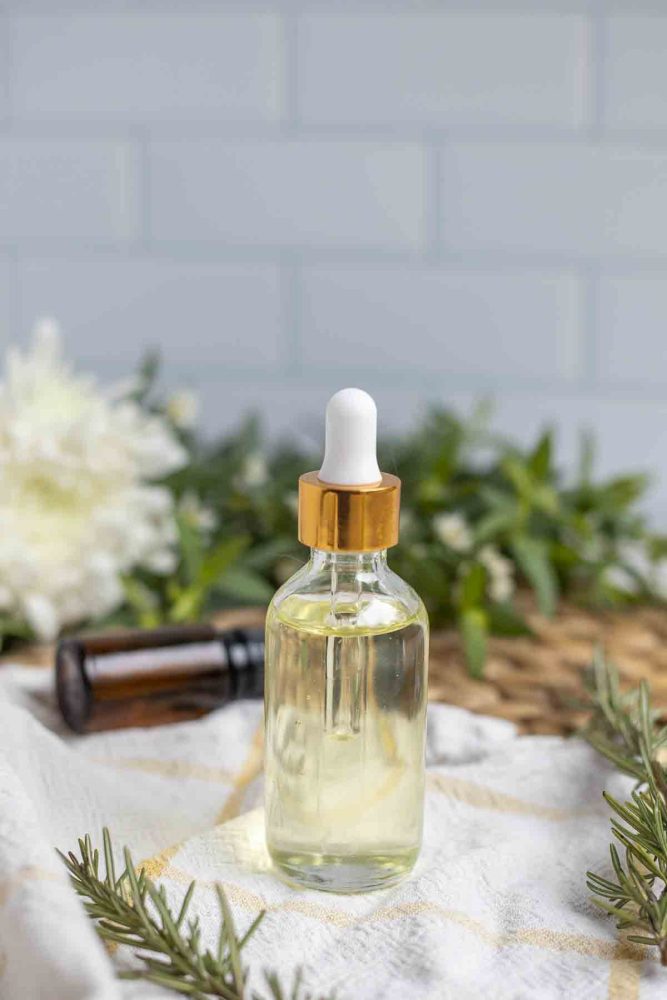
Tips for Using and Applying Rosemary Oil
- When it comes to applying the oil, remember that a little goes a long way. Start with just a small amount and massage it gently into your scalp using your fingertips. This will help stimulate blood circulation and ensure that the oil is evenly distributed throughout your hair.
- For best results, leave the rosemary oil in your hair for at least 30 minutes before washing it out. You can also choose to leave it overnight if you prefer a deep conditioning treatment. In either case, cover your hair with a shower cap or towel to allow the oil to fully absorb into your strands and to make it less messy.
- As with any new hair product, it’s always a good idea to do a patch test before applying it all over your scalp. This will help ensure that you don’t have any allergic reactions or sensitivities to the oil. Simply apply a small amount of the oil to a discreet area on your scalp and wait 24 hours to see if any adverse reactions occur.
- Consider incorporating it into your regular hair care routine. You can add a few drops of rosemary essential oil to your shampoo or conditioner, or even create a DIY hair mask by mixing it with other natural ingredients such as coconut oil or aloe vera gel.
- Consistency is key. It’s important to use it regularly to see the full benefits. Aim to use the oil at least two to three times a week and be patient – hair growth takes time, so don’t expect overnight miracles.
The following are affiliate links. We are a participant in the Amazon Services LLC Associates Program, an affiliate advertising program designed to provide a means for us to earn fees by linking to Amazon.com and affiliated sites.

Benefits of Rosemary Oil For Hair
Rosemary oil can stimulate the hair follicles, promoting hair growth and preventing hair loss.
The active compounds in rosemary help to improve blood circulation in the scalp, ensuring that the hair follicles receive the necessary nutrients and oxygen for optimal growth. (source)
This increased blood flow to the scalp not only encourages hair growth but also strengthens the hair follicles, reducing breakage and promoting overall hair health.
In addition to promoting hair growth, rosemary oil is also known for its ability to combat dandruff and dry scalp. Its antimicrobial, antifungal, and anti-inflammatory properties help to alleviate scalp conditions, soothe irritation, and normalize the production of oil. (source)
By incorporating it into your hair care routine, it can help reduce flaky, itchy and irritated scalp and achieve a healthier, more balanced scalp environment. Something that I have personally benefited from.
Some people believe it can prevent premature graying of hair, although there is no scientific evidence that I could find. Its antioxidant properties protect the hair follicles from oxidative stress caused by free radicals, which can lead to premature aging of the hair.
It can improve hair thickness and texture. The nutrients present, such as vitamins A, C, and vitamin E, along with minerals like iron and calcium, nourish the hair shaft and strengthen the strands from within. This results in thicker, more voluminous hair with improved texture, making it easier to style and manage.
Lastly, rosemary is known for its calming and stress-relieving properties. The soothing aroma can alleviate stress and tension, creating a beneficial environment for hair growth. (source)

Ingredients:
Sprigs of fresh rosemary or rosemary essential oil: Make sure to choose high-quality rosemary sprigs to extract the maximum potency and effectiveness. You can either gather rosemary from your garden or purchase it from a local herb store.
Or for an easier way, you can use rosemary essential oil or dried rosemary.
Carrier oil. Carrier oils serve as a base to dilute the rosemary and carry its properties onto your scalp. There are various carrier oils available, but the most commonly used ones for hair care include olive oil, coconut oil, avocado oil, castor oil, and jojoba oil.
Each of these carrier oils offers its own unique benefits, so feel free to choose the one that suits your hair type and preferences. Or mix the oils.
None of these oils will directly increase hair growth, but they can have anti-inflammatory properties in them which can help soothe, moisturize, and promote a healthy scalp.
Essential oils: Additionally, you might want to consider adding a few drops of essential oils to enhance the fragrance and therapeutic properties of your rosemary oil.
Lavender oil, peppermint oil, or tea tree oil are popular choices that complement the natural aroma of rosemary and provide additional benefits for your hair and scalp.
Tools you may need:
Glass jar (like a mason jar) or bottle for storage. It is recommended to use a dark-colored glass container to protect the potency of the oil from light exposure.
Saucepan
Save This Recipe
With these simple ingredients at hand, you’re now ready to embark on the journey of creating your very own DIY rosemary oil for hair growth. Let’s dive into the step-by-step process of making this nourishing oil in the next section.
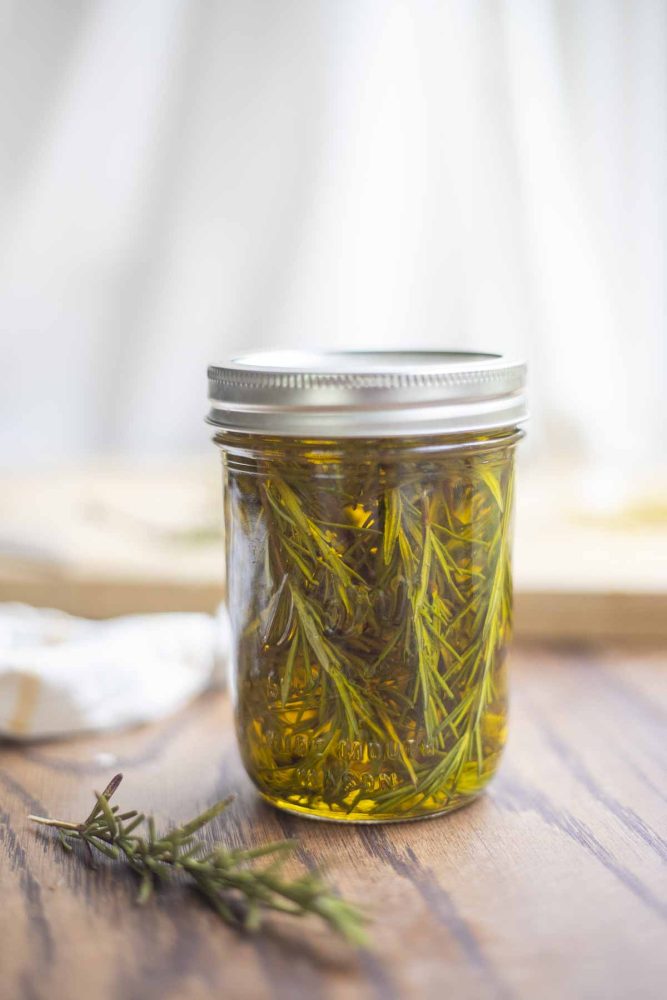
How To Make Rosemary Oil For Hair Growth With Fresh Rosemary
Gather fresh rosemary sprigs, about two to three large handfuls, and wash them thoroughly to remove any dirt or debris.
Allow the rosemary to dry completely by allowing it to air dry for at least a few hours or by gently patting it dry with a clean towel. Any moisture remaining on the sprigs will cause it to mold and spoil the oil.
Once your rosemary is dry, it’s time to infuse it into a carrier oil. The most commonly used carrier oil for this purpose is olive oil, but you can also experiment with other oils such as coconut or jojoba oil.
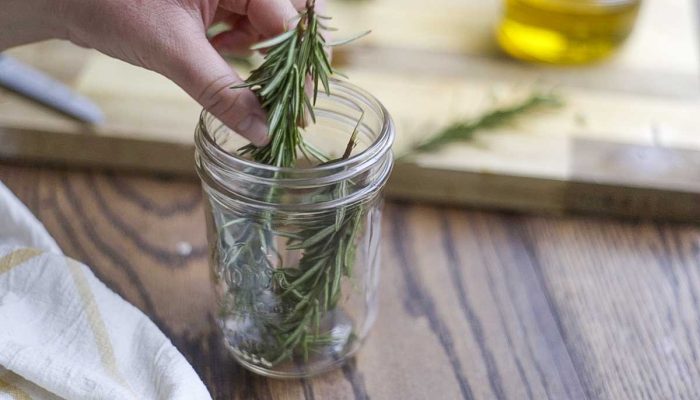
Remove the rosemary leaves from the sprigs and chop them coarsely to release their aromatic oils. (optional)
In a small saucepan, heat the carrier oil over low heat until it becomes warm but not boiling. Add the chopped rosemary leaves to the warm oil and gently stir to ensure they are fully immersed.
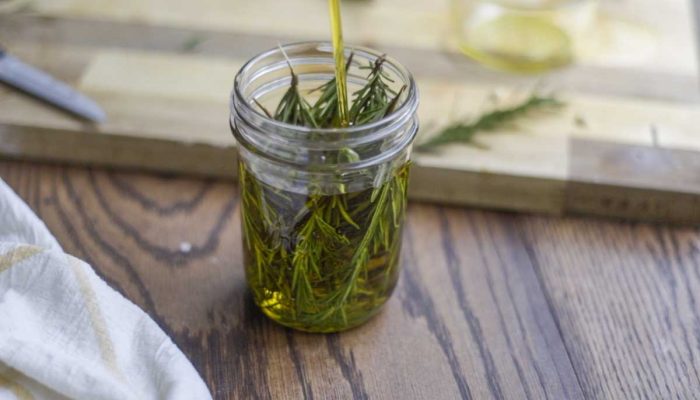
Allow the mixture to simmer on low heat for about 2 hours, stirring occasionally to prevent sticking. Or place it in a warm place, like a sunny window, for a few weeks.
Remove the saucepan from the heat and let cool completely.
Once cooled, strain the oil through a fine-mesh sieve or cheesecloth into a clean glass jar or bottle.
Discard the leftover rosemary leaves and seal the container tightly.
Store in a dark place.
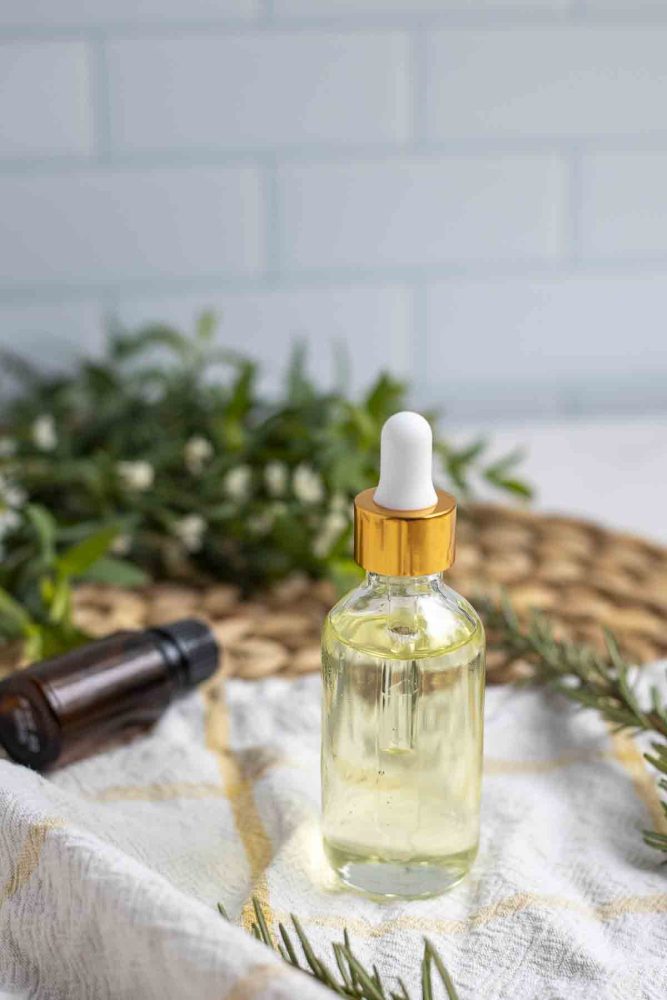
How To Make Rosemary Oil With Essential Oils

To a jar, add carrier oil.

Next, add 18 drops of rosemary essential oil per oz of oil (this is a 3% dilution). You can also add other oils like lavender and peppermint oil.
Mix and you are ready to go.
How To use Rosemary Oil:

Before showering, use it as an oil treatment by massaging the pure rosemary oil directly to your scalp in small circles.
Allow to sit for at least 30 minutes or longer. I like to also add a little to the ends of my hair. It’s a great way to add extra moisture to my dry ends.
Rinse with shampoo and follow up with conditioner.
Other Home Remedies to Promote Healthy Hair Growth
- Rosemary water: This can be sprayed directly on the scalp daily or used as a rosemary-infused rinse in the shower.
- Hair masks: There are several other home remedies that you can easily incorporate into your hair care routine to promote hair growth. One popular option is using a homemade egg mask. Eggs are rich in proteins and essential nutrients that can nourish your hair follicles and stimulate growth. To create an egg mask, simply beat one or two eggs in a bowl and apply the mixture to your scalp and hair. Leave it on for about 30 minutes before rinsing it out with cold water and shampooing as usual.
- Scalp massage using essential oils. Massaging your scalp not only feels great but it can also increase blood flow to the hair follicles, promoting growth. You can enhance the benefits of a scalp massage by incorporating essential oils known for their hair-stimulating properties, such as lavender, peppermint, or cedarwood oil. Dilute a few drops of your chosen oil with a carrier oil like coconut or jojoba oil, and gently massage it into your scalp for a few minutes before washing your hair.
- In addition to external treatments, it’s important to nourish your hair from within by ensuring you have a balanced diet. Foods rich in vitamins A, C, and E, as well as biotin and iron, are particularly beneficial for hair growth. Incorporate foods like spinach, sweet potatoes, avocados, citrus fruits, and nuts into your meals to provide your body with the necessary nutrients for healthy hair.
- Adding collagen rich foods (like bone broth) or a supplement (like collagen peptides) can also promote strong thick hair.
FAQ:
The frequency of using rosemary oil for hair growth depends on your individual needs and preferences. For most people, applying two to three times a week can be sufficient.
However, some individuals with specific hair conditions or goals may benefit from more frequent use.
It’s important to listen to your hair and observe how it responds to the treatment. If you notice any adverse effects of excessive dryness, consider reducing the frequency of use.
Absolutely! Mixing with other essential oils can enhance its benefits and create a personalized blend for your hair. Some popular options include lavender oil, peppermint oil, and cedarwood oil. Experiment with different combinations and ratios to find the perfect blend that suits your hair’s needs and provides the desired results.
Some people may start noticing improvements after a few weeks of consistent use, while others may take longer. Patience is key when it comes to hair growth. While rosemary oil has been known to promote hair growth, it’s important to note that individual results may vary.
Remember that hair growth is a gradual process, and it’s essential to continue using rosemary oil as part of your hair care routine for an extended period to see significant changes.
Leaving rosemary oil on your scalp overnight can be beneficial for some individuals, as it allows the oil to deeply nourish and penetrate the hair follicles.
However, it’s important to consider your hair type and if you have sensitive skin. If you have a sensitive scalp or are prone to oil buildup, you may want to rinse off the oil after a few hours instead.
Finding the right balance is crucial to prevent any potential scalp irritation or excessive greasiness.
It will last about 2 months in a cool dark place. It make keep up to 5-6 months in the refrigerator.
Mix together 1 tablespoon of castor oil and 5-10 drops of rosemary essential oil. 10 drops would be about 3% dilution.

Safety:
Rosemary oil is generally safe to use for promoting hair growth. However, as with any product, some individuals may experience mild allergic reactions or skin irritation. I
t’s always recommended to perform a patch test before using this recipe on your scalp and discontinue use if you notice any adverse effects.
Additionally, if you have any underlying medical conditions or are pregnant or breastfeeding, it’s essential to consult with a healthcare professional before incorporating it into your hair care routine.
Find More Natural Remedies:
If you try this recipe and love it, I would appreciate you coming back and giving it 5 stars. Please and thank you!

Rosemary Oil For Hair
Save This Recipe
Equipment
- fine mesh strainer
Ingredients
- 2 oz carrier oil castor, olive, jojoba, or argan oil
- 36 drops rosemary essential oil or a bunch of fresh rosemary
Instructions
Rosemary Oil With Fresh Rosemary
- To a jar, add carrier oil.
- Next, add 18 drops of rosemary essential oil per oz of oil. You can also add other oils like lavender and peppermint oil.
- Mix and you are ready to go.
Rosemary Oil With Fresh Rosemary
- Gather fresh rosemary sprigs, about two to three large handfuls, and wash them thoroughly to remove any dirt or debris.
- Allow the rosemary to dry completely by allowing it to air dry for at least few hours or by gently patting it dry with a clean towel. Any moisture remaining on the sprigs will cause it to mold and spoil the oil.
- Once your rosemary is dry, it’s time to infuse it into a carrier oil. The most commonly used carrier oil for this purpose is olive oil, but you can also experiment with other oils such as coconut or jojoba oil.
- Remove the rosemary leaves from the sprigs and chop them coarsely to release their aromatic oils.
- In a small saucepan, heat the carrier oil over low heat until it becomes warm but not boiling.
- Add the chopped rosemary leaves to the warm oil and gently stir to ensure they are fully immersed.
- Allow the mixture to simmer on low heat for about 2 hours, stirring occasionally to prevent sticking.
- Remove the saucepan from the heat and let the rosemary oil cool completely.
- Once cooled, strain the oil through a fine-mesh sieve or cheesecloth into a clean glass jar or bottle.
- Discard the leftover rosemary leaves and seal the container tightly.
- Store in a dark place.
To Use:
- How To use Rosemary Oil:
- Before showering, use it as an oil treatment by massaging the pure rosemary oil directly to your scalp in small circles. Allow to sit for at least 30 minutes or longer. I like to also add a little to the ends of my hair. It’s a great way to add extra moisture to my dry ends.
- Wash well with shampoo and follow up with conditioner.


